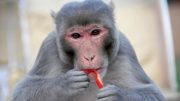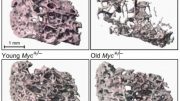
In a new study, researchers discovered a link between reduced oxygen intake and longer lifespan in lab mice, highlighting the potential of “oxygen restriction” in anti-aging. Mice bred to age faster, when moved to an oxygen-restricted environment (11% oxygen, similar to the oxygen level at an altitude of 5000 meters), lived about 50% longer than mice in normal oxygen conditions (21%). This extended lifespan was not due to changes in food intake, suggesting other mechanisms are at play. Further research is needed to understand the molecular mechanisms behind this phenomenon and potential implications for human longevity.
Lab analysis suggests for the first time that reduced oxygen intake might extend mammalian lifespan.
Researchers have found that reduced oxygen intake, or “oxygen restriction,” is linked to a longer lifespan in lab mice. Mice in oxygen-restricted environments lived about 50% longer than those in normal conditions, showing delayed aging-associated neurological deficits. This suggests a new potential anti-aging strategy beyond known methods like dietary restriction. Further study is required to determine its human applications.
For the first time, researchers have shown that reduced oxygen intake, or “oxygen restriction,” is associated with longer lifespan in lab mice, highlighting its anti-aging potential. Robert Rogers of Massachusetts General Hospital in Boston and colleagues present these findings in a study published on May 23rd in the open access journal PLOS Biology.
Research efforts to extend healthy lifespan have identified a number of chemical compounds and other interventions that show promising effects in mammalian lab animals— for instance, the drug metformin or dietary restriction. Oxygen restriction has also been linked to longer lifespan in yeast, nematodes, and fruit flies. However, its effects in mammals have been unknown.
“We find that chronic continuous hypoxia (11% oxygen, equivalent to what would be experienced at Everest Base Camp) extends lifespan by 50% and delays the onset of neurologic debility in a mouse aging model.” — Robert Rogers
To explore the anti-aging potential of oxygen restriction in mammals, Rogers and colleagues conducted lab experiments with mice bred to age more quickly than other mice while showing classic signs of mammalian aging throughout their bodies. The researchers compared the lifespans of mice living at normal atmospheric oxygen levels (about 21 percent) to the lifespans of mice that, at 4 weeks of age, had been moved to a living environment with a lower proportion of oxygen (11 percent – similar to that experienced at an altitude of 5000 meters).
They found that the mice in the oxygen-restricted environment lived about 50 percent longer than the mice in normal oxygen levels, with a median lifespan of 23.6 weeks compared to 15.7 weeks. The oxygen-restricted mice also had delayed onset of aging-associated neurological deficits.
Prior research has shown that dietary restriction extends the lifespan of the same kind of fast-aging mice used in this new study. Therefore, the researchers wondered if oxygen restriction extended their lifespan simply by causing the mice to eat more. However, they found that oxygen restriction did not affect food intake, suggesting other mechanisms were at play.
These findings support the anti-aging potential of oxygen restriction in mammals, perhaps including humans. However, extensive additional research will be needed to clarify its potential benefits and illuminate the molecular mechanisms by which it operates.
Rogers adds, “We find that chronic continuous hypoxia (11% oxygen, equivalent to what would be experienced at Everest Base Camp) extends lifespan by 50% and delays the onset of neurologic debility in a mouse aging model. While caloric restriction is the most widely effective and well-studied intervention to increase lifespan and healthspan, this is the first time that ‘oxygen restriction’ has been demonstrated as beneficial in a mammalian aging model.”
Reference: “Hypoxia extends lifespan and neurological function in a mouse model of aging” by Robert S. Rogers, Hong Wang, Timothy J. Durham, Jonathan A. Stefely, Norah A. Owiti, Andrew L. Markhard, Lev Sandler, Tsz-Leung To and Vamsi K. Mootha, 23 May 2023, PLOS Biology.
DOI: 10.1371/journal.pbio.3002117






Has anyone read the “Dr. Ox’s Experiment” by Jules Verne?
A recent article has suggested the opposite to this study’s claim:
https://scitechdaily.com/holy-grail-hyperbaric-oxygen-treatments-reverse-aging-process-in-first-clinical-trial/
Is there any evidence that humans or other mammals, living in the Andes Mountains or the Tibetan Plateau, live longer than their counterparts at lower altitudes?